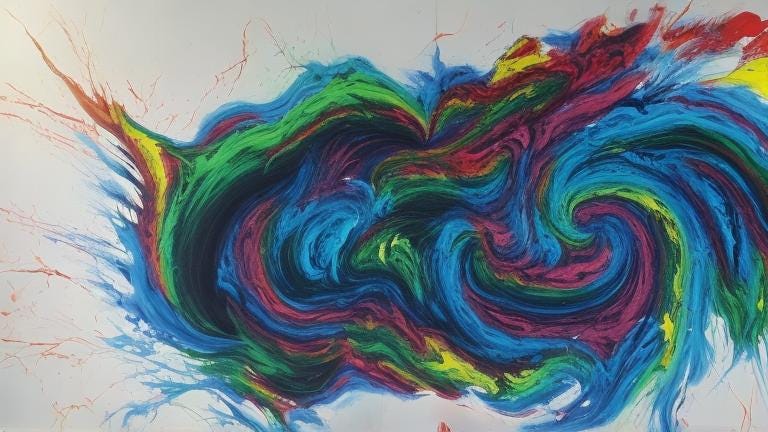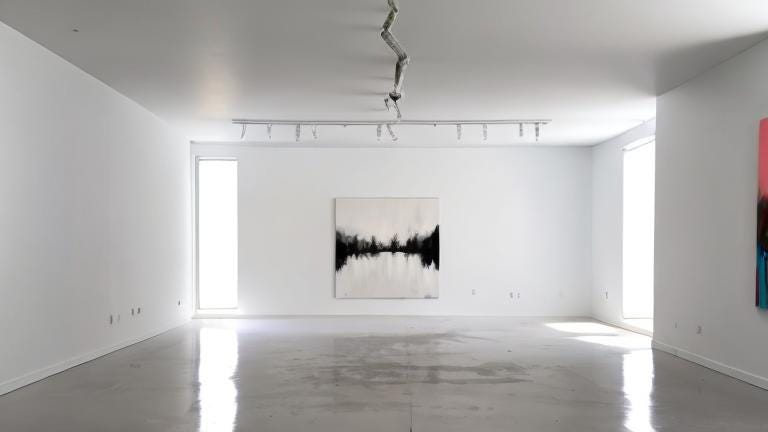Grief Canvases: The Art of Moving On
From wounds to wisdom — A perspective on the journey of grief

Really? How? Why? What happened? What went wrong? Why now.
Questions are often what remains after a catastrophe. The occurrence of the situation twists our vision, shrouding us in mysteries, leaving us with unresolved feelings.
The occurrence
Indeed, there is beauty in grief. It brings the most value out of the thing you’re moving away from. You start to truly value the past once it’s no longer there. Everything before the disaster becomes sacred.
The grief will always be for something you wish had happened, and something you wish that hadn’t. You might grieve a person’s absence, or presence. Whatever it is, you reminisce the past, and the unfulfilled future. You live in the past and the lost future, but never in the present. You stand there, with unanswered questions, having your soul drained with every passing thought.
The aftermath will inevitably take its course, serving as a haunting reminder of the disaster that preceded it. The disaster happened, and it’s a fact. It became a record,
a permanent part of our history, our memories, and our character.

Severity
People mistake moving on as severing the unnecessary parts. You either forget, or you continue to suffer and stay in the same place. Moving on isn’t forgetting, or forgiving. It’s a transformation. Just like a burn wound: Depending on the degree, it might sting for a while, it might leave permanent scars, or it might completely burn the flesh and make it numb. You never will forget what happened and “just move on”.
You’re not subtracting, you’re adding on top of whatever you previously had
That’s the reason why a healthy foundation is necessary. A foundation of the mind and the soul, will help you move on, and quickly realize this moving train isn’t going to stop. Time goes by, whether you’re ready for it or not. This is the harsh reality we live in. Some might not accept this, and choose to live in a convenient illusion conducted inside their heads.
The foundation
Have you figured it all out already? How would you know if you have a good foundation? Whatever that means.
Self-definition is the answer. Whatever you define as a healthy foundation, will be your criteria to base your judgment on. Your definitions matter, so consider them carefully. Being self-critical is important, but beating yourself to a pulp doesn’t symbolize it well. Rather, think about yourself as a friend whom you care about: How would you advise him? What would you say? What wouldn't you say?
While self-criticism holds importance, its purpose lies in guiding you to a positive place, not in burying yourself deeper into the ground. However, avoid making it too effortless; balance is key.
The process of building the foundation can very well be the process of moving on
Being a support
Pain paints happiness. At its essence, the definition of a concept finds meaning in its opposite; our understanding of good emerges from the existence of evil. We recognize darkness because there is light, and we can gaze upon the stars because we have solid ground beneath us. Happiness, in its truest forms, gains depth from its contrast with sadness. Without the backdrop of pain, challenges, responsibilities, or difficulties, the very essence of happiness loses its significance. Therefore, let the pained feel his pain.
But I want to help
Timing matters. If you ask a newly-car-accident participant to move on, he might punch your face with his broken hand. Time and place are the unequivocal variables that engrave the path to the other side. Be thoughtful of their importance and presence, and use them wisely.
They need a companion, not a guru
The journey of moving on is often a solitary one. Even if you’ve weathered the storm with others beside you, traversing through your emotions will be a lonely journey, as the unique depth of your feelings remains yours alone. A key aspect of supporting someone is to be present. Let them know of your presence, and be there for them, mentally, and physically if possible. And heck, if they need you to be a guru, then take your pagri out from the wardrobe, and wear it as long as you need to.
Grief canvas
A catastrophe is a canvas. It gets painted in a very abrupt way. Almost as if life took a bucket of paint and hurled it onto a blank sheet of paper. That paper turns then into a canvas, and lands in front of your eyes. Without any warnings, it comes into existence, lingering right in front of you, depriving you of your senses and your surroundings with its haunting presence.

When it’s too close, you can see it clearly, with all its painful details. It’s hard to divert your eyes when it’s all you can see. As the winds of wisdom whisper, 'It will be okay' in your ears, it's challenging to absorb those words when all your senses are fixated on the canvas merely 5 centimeters from your face.
Time
The unyielding principle of time is that nothing stays the same. Paradoxically, the one certainty in this unchanging rule is the inevitability of everything else changing. Everything will change; whether for good or bad remains to be answered.
In the normal course of grief, the canvas will gradually drift away from you. The more time passes, the further it will go, and the fewer details you will see. Until one day, you start noticing your surroundings again, slowly, as the canvas fades away, lingering in the distance, reminding you of a time when this was all you could see.
Contrastingly, lingering on the past is different. It will be as if you are forcefully wrenching the canvas from its original trajectory, casting it on the ground, and sitting beside it in sorrow—either refusing to stand up or being unable to. Escaping such a situation is challenging; often, a strong faith becomes not only necessary but a vital aspect for resolving this predicament.

Faith
In the intricate tapestry of life, there exists a certain beauty in grief. Emotions, much like the flow of a river, are in a constant state of change. None is ever-lasting, even love. Love can grow, and mature into something more beautiful, but it will never remain the same. Love, sorrow, and anger, all evolve, shaping our experiences in unique ways. They might burden your shoulders with heavy baggage of resentment and disappointment, or they might give you peace, wisdom, and strength.
Amidst the challenges, have faith that things will be alright. Express your feelings in a way that suits you, be physically active, talk to someone about your concerns, or don’t. Put yourself out there, be patient, and have faith that beauty is bound to be on your way, because your faith will certainly attract it.